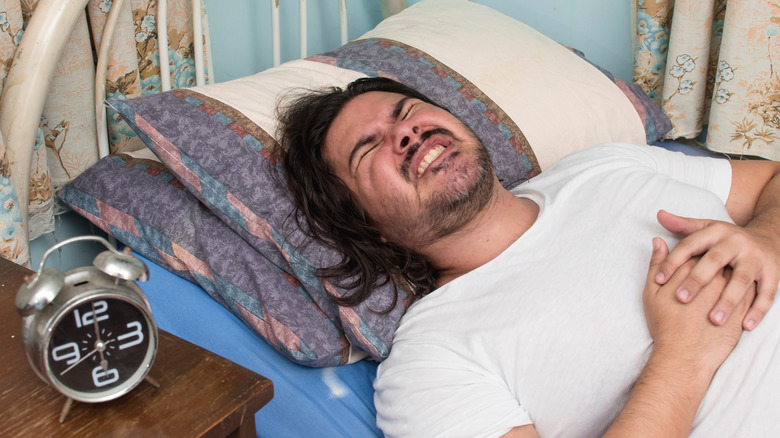Do Your Sleep A Favor And Swap Your Bed For This Hanging Item
It should be no surprise that sleep is more than just a little rest and recharge; it plays a vital role in your physical and mental health and prevents diseases from creeping in. Dr. Maiken Nedergaard, a sleep researcher at the University of Rochester, told NIH News in Health, "When we sleep, the brain totally changes its function. It becomes almost like a kidney, removing waste from the system."
Removing all the waste of the day from your brain and body makes you healthier by lowering your heart rate and blood pressure, preparing your liver for digesting fats, increasing specific immune cells to help fight viruses, and helping the brain create long-term memories (per National Heart, Lung, and Blood Institute). Not getting enough sleep can lead to increased hunger, metabolic syndrome, high blood pressure, obesity, and even stroke.
No matter how you slice it, getting enough sleep is vital, but insomnia and chronic pain can be a significant deterrent in the sleep department, especially when you struggle to find comfort in a traditional bed. Fortunately, research shows that a hammock could help.
Reduce insomnia with a hammock
You've probably used a hammock once or twice when camping or reading in your yard. Hammocks are a common sleeping item around the globe, especially in areas like Asia and Latin America, per Seaside Hammocks.
Research shows that the rocking motion of a hammock could play a role in reducing insomnia. Current Biology published research in 2011 that looked at the sleeping patterns of 12 healthy males with no known sleep or napping disorders on a hammock for three consecutive nights. The researchers noted that the rocking motion facilitated by the hammock worked to help the participants fall asleep faster, increase the light stage 2 sleep, boost slow oscillations, and reinforce sleep rhythms. Co-author Michel Muhlethaler, professor of neuroscience, told NPR, "It's not just you go faster to sleep, but also while you sleep, your sleep is deeper. That was a total surprise for us."
Therefore, hammock sleeping checks off two essential boxes for sleep: quality and quantity. The health benefits of getting more quality sleep include getting sick less often, thinking more clearly, reducing stress, and improving your risk for serious illnesses like heart disease, per the Office of Disease Prevention and Health Promotion.
A zero-pressure sleeping position can lead to more comfortable rest
Have you ever laid in bed only to feel a stitch in your hip? You roll over onto your back and get a pain in your lower back. This can leave you tossing and turning in your bed as you try to adjust to get comfortable. A hammock has your body elevated and cocooned within the material, relieving specific pressure areas.
According to Healthline, your glutes, back, and shoulders are targeted when you have a regular mattress due to the specific curves within your body. Hammocks don't have these pressure point areas because they mold to your body and provide equal pressure all around, like a warm hug. You're also floating in the air, so there aren't any strange dips or worn areas as you would find in a worn-out traditional mattress.
While adult studies on pressure points and hammocks are uncommon, 2019 research in Respiratory Care showed that pain was reduced by using hammock positioning on preterm infants in the ICU when compared to a regular bed. Additionally, per anecdotal evidence from users on Hennessy Hammock, many individuals with lower back pain find that sleeping in a hammock at night give them better-quality sleep and more comfort. Some avid campers stated they switched to using their camping hammock at home due to improved sleep quality.
Should you use a hammock if you have GERD?
According to the Mayo Clinic, stomach acid backs up in those with gastroesophageal reflux disease (GERD) because of a problem with the sphincter separating the stomach and esophagus. The weak sphincter and acid accumulation create an irritated esophagus, leading to pain in your chest, burping acid, and indigestion.
Traditional mattresses are typically flat, meaning gravity no longer works in favor of your faulty sphincter, giving it free rein to wreak havoc in the esophagus when you sleep. Many experts suggest modifying your sleep position by having a pillow that raises the head during sleep to keep gravity working a bit, per the Sleep Foundation. Rather than trying to sleep with a bulky pillow, a hammock might help GERD sufferers.
Hammocks dip in the middle, meaning your head is naturally elevated to be higher than your stomach. You're also sleeping on your back, so there isn't any pressure on the stomach like there might be from stomach or side sleeping. Acid-free sleeping is a side effect.
Things to consider before swapping your bed for a hammock
There are pros and cons to every situation in life, and choosing to toss your bed to the curb and grab a hammock is no different. One of the most obvious downsides of having a hammock is that it is made for one person only, unless you opt for a double. However, two people in your hammock aren't going to give you the same quality of sleep and may worsen sleep quality due to the motion of your partner. Therefore, spouses, families, and pet snugglers might not find the hammock way of life meant for them.
Also, according to Healthline, hammocks have limited space. Therefore, finding your perfect sleeping position, being able to spread out, and stiffness can be a bummer. It's also not the easiest contraption in the world to get in and out of, which can be challenging for those with limited mobility and increase the risk of falling.
Dr. Stefano Sinicropi, MD, also notes that sleeping on a hammock can be challenging for those with spine disorders, especially scoliosis and pinched spinal nerves, since it forces them to lie on their back. Therefore, before going all in on a hammock bed, those with back or nerve issues may want to give a shout-out to their specialist or do a temporary trial.





